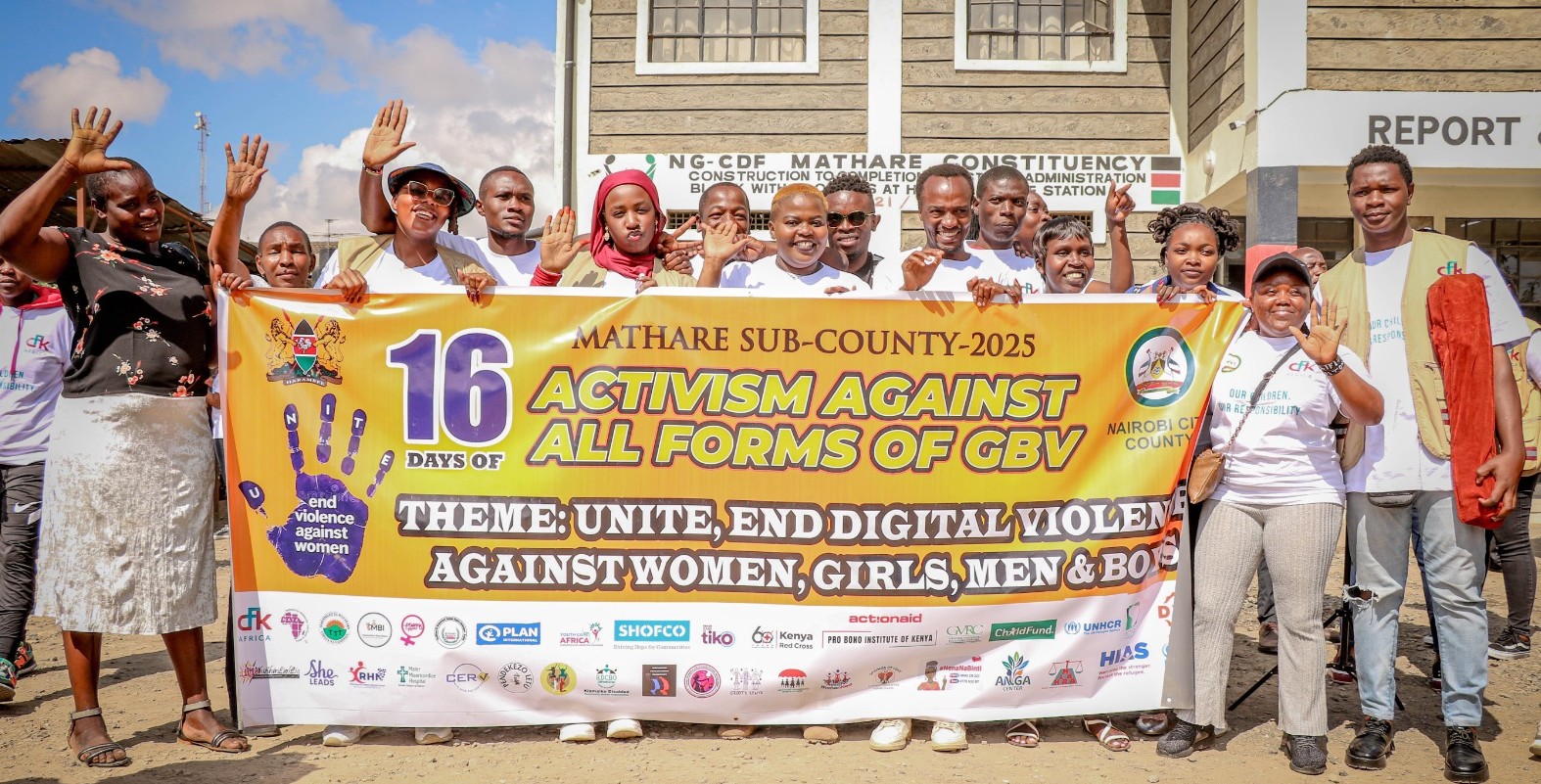STATEMENT ON COMMEMORATION OF THE OF THE 16 DAYS OF ACTIVISM AGAINST GENDER-BASED VIOLENCE
The National Gender and Equality Commission joins Kenya and the rest of the world in marking the 2025 Sixteen (16) Days of Activism campaign Against Gender-Based Violence. This campaign happens every year from 25th day of November (the International Day for the Elimination of Violence Against Women) to 10th Day of December, the World Human Rights Day. This year’s theme, is “UNiTE to End Digital Violence Against All Women and Girls.”
Gender-Based Violence remains a serious public health, human right, and social development problem , affecting women, men, girls, and boys. While women and girls continue to bear the greatest burden of all forms of violence, national evidence shows that men and boys are also survivors of GBV. In Kenya, more than a third of women aged 15 to 49 have experienced physical violence, and at least one in eight have faced sexual violence. These figures, though alarming, are vague and mask many inequalities . Many cases of violence go unreported due to stigma, fear of retaliation, lack of trust in the justice system, or limited access to safe reporting channels. Moreover covert forms of violence are on the rise: The emotional and economic forms of violence, as well as online and off line digital violence
In the last half decade, Kenya has been witnessing escalation of femicide and Technology-Facilitated Violence-TFGBV. Data compiled by the Africa Data Hub (2024) shows that more than 930 female murders were reported since 2016, with at least 628 cases meeting the UNODC definition of femicide. In 2024, media-verified reports indicate that approximately one woman lost her life every day in gender-motivated killings.
With growing internet access and digital participation, violence has expanded into online spaces where threats, harassment, cyberbullying, image-based abuse, stalking, extortion, and impersonation are increasingly getting common. In 2023 study by UNFPA Kenya showed that nearly 90% of young adults in tertiary institutions had witnessed TFGBV, while 39% had personally experienced it. IREX’s digital safety assessment in Kenya show that women in leadership, journalism, activism, and young people face heightened risk of TFV.
Kenya has made strides in preventing and responding to Gender-Based Violence through among others; strengthened policy and legal reforms, the establishment of GBV recovery centres, the operationalization of specialized GBV courts, increased public awareness, male engagement initiatives, and improved coordination structures at national and county levels. However, critical gaps persist. Enforcement of existing laws remains uneven, investigations are frequently delayed or inconclusive, and conviction rates for GBV-related offences especially on TFGBV are worryingly low. Many counties and institutions face funding constraints, limiting the availability and quality of shelters, psychosocial support, legal aid, and digital safety programmes. Deeply rooted social norms and patriarchal attitudes normalize violence, silence survivors, and protect perpetrators from accountability. In addition, weak documentation and limited data on GBV including on feminicide, female genital mutilation and TFV hinder effective planning, early warning, resource allocation, and targeting interventions.
As Kenya marks this year 16 Days of Activism Against Gender-Based Violence, we must move beyond awareness and commit to concrete, measurable action. The rise in TFGBV and the alarming increase in femicide demand a unified national response. Every sector, every institution, and every community has a role to play follows:
- The National Government to strengthen enforcement of GBV laws, invest in fasttrack investigations and prosecutions, expand forensic capacity, expand survivor support services, and scale up GBV data systems
- Justice sector aims higher to reduced GBV case backlogs, improve evidence management, and guarantee timely justice for survivors and perpetrators.
- County Governments continue to allocate resources for shelters, psychosocial support, community sensitization, and prevention initiatives; and strengthen county-level coordination through Gender Sector Working Groups and referral mechanisms.
- Digital Service Providers and managers of the Online Platforms, to strengthen safeguards against online abuse, enhance content moderation, provide accessible reporting mechanisms, and cooperate with authorities to eliminate off and online digital violence. Importantly is the continual improvement and robust integration of safety-by-design principles in the development, governance, and management of digital platforms.
- Communities, Families, Religious, Cultural and Political Leaders to reject harmful norms, promote respectful relationships, speak out against violence, and support survivors without discrimination.
- That Men and Boys actively participate as allies in prevention of GBV, champion constructive masculinity, and model respect and equality in homes, schools, workplaces, communities, and online spaces.
- Civil Society, Private Sector and Development Partners recommit to support survivor services, expand digital literacy programmes, invest in prevention efforts, and strengthen generation of evidence to guide policy and interventions.
And to all Kenyans, that you shall report violence, support survivors, challenge harmful attitudes, and help create safe homes, communities, and safe digital environments. Every woman and girl have the right to live free from fear in public, private and in digital spaces.
Let us all “UNiTE to End Digital Violence against All Women and Girls”.
Hon. Rehema Jadesa
CHAIRPERSON


Comments